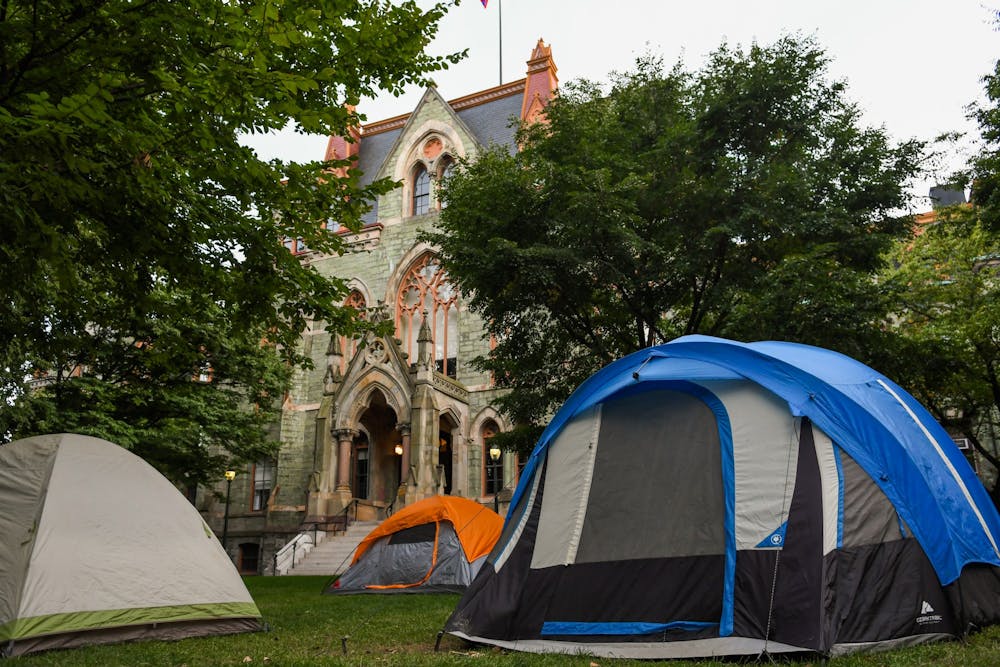
Several international climate policy leaders paid a visit to Fossil Free Penn's encampment on College Green last Friday while attending a conference on campus.
The scholars attended a climate-based conference at Perry World House on Sept. 30 and stopped by FFP's demonstration on the sixteenth day of encampment. Those who visited FFP included Kotchakorn Voraakhom, a Thai landscape architect and PWH visiting scholar, Olúfẹ́mi Táíwò, a Georgetown University associate professor of philosophy, and Vincent Pijnenburg, a professor at Fontys University of Applied Sciences.
Penn English professor Chi-ming Yang — who attended the PWH conference organized by Penn faculty members Simon Richter and Matthijs Bouw — said that she invited several of the visiting dignitaries to stop by the encampment during the the conference’s break.
FFP has been camping out on College Green since Sept. 14, with three main demands to Penn President Liz Magill and the Penn administration: divest endowment funds from the fossil fuel industry, preserve the University City Townhomes currently facing eviction, and pay PILOTs — payments in lieu of taxes — to the Philadelphia public school system.
Táíwò, the keynote speaker at last week’s conference said that he is impressed by the agency of students continuing the encampment.
“I think it’s impressive and inspiring that people are willing to take political actions that use leverage rather than just asking for things,” Táíwò said. “My hopes are that the students realize that they have more power than they think they do.”
Pijnenburg, who focuses his research on trends in Dutch-German cross-border climate immigration due to rising sea levels, said that he hopes Penn will recognize that climate justice extends beyond its students and to the greater Philadelphia area.
“It’s important that the University realizes that the students are the most important target group in their audience,” Pijnenburg said. “Students should get a voice in such important topics, which are not only relevant for the university itself... but also for the people that are living here in the city."
Voraakhom, who received recognition at the 2020 UN Global Climate Action Awards, said that the encampment embodies the intergenerational impact of climate change. Having attended Harvard University, she recognizes the influence that Penn has as an institution, and hopes that it and other visible universities will step up to lead climate action in future years.
“We are looking up to these Ivy League universities,” Voraakhom said. “We can find a best practice that universities [and] younger generations can be a part of."
FFP coordinator and College junior Sarah Sterinbach said that Princeton University officially announced its commitment to divest in fossil fuels this week, making Penn one of two Ivy League institutions that have yet to divest. She said that since Penn’s COVID-19 action plan followed Princeton’s so closely during the pandemic, she hopes that the University will soon follow suit on divestment practices as well.
“There’s global momentum around this movement, and with other climate leaders [visiting], it shows it’s not just young people that need this change,” she said. “It’s everyone, everywhere.”
Sterinbach said that as the group continues with the protest, she hopes attention like this from outside sources will pressure Penn to take steps towards divestment in the fossil fuel industry, as most of the University’s peer institutions have.
“The fact that there are people that are visiting Penn and interested in coming [to the encampment] shows that Penn could be a climate leader,” Sterinbach said.
FFP coordinator and College junior Jae Hargest said that students are willing stay on College Green as long as it takes, and they are "fully prepared" to stay over fall break.
“Ideally, I don't want to be here tomorrow. I would love it for Penn to just give into our demands, meet with us, make a public statement committing to saving the townhomes and committing to divestment," Hargest said. “But if they don't, we'll still be here as long as we need to.”
Correction: A previous version of this article incorrectly stated that Penn English professor Chi-ming Yang organized the climate-based conference, when, in fact, the conference was organized by Penn faculty members Simon Richter and Matthijs Bouw. The DP regrets this error.
The Daily Pennsylvanian is an independent, student-run newspaper. Please consider making a donation to support the coverage that shapes the University. Your generosity ensures a future of strong journalism at Penn.
Donate







